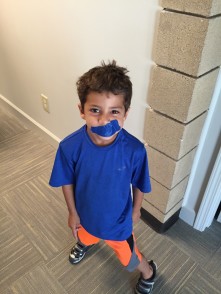Can a 5-year old teach you how to take better depositions?
 I have a five-year old boy named Apollo. He’s a normal boy, full of energy and excitement. But he has a unique trait: within the span of about three minutes he’s able to get my wife to admit to anything, even the Lindberg Baby Kidnapping, to make him stop asking questions. So let’s talk about how 5-year old Apollo can teach you how to take a better deposition.
I have a five-year old boy named Apollo. He’s a normal boy, full of energy and excitement. But he has a unique trait: within the span of about three minutes he’s able to get my wife to admit to anything, even the Lindberg Baby Kidnapping, to make him stop asking questions. So let’s talk about how 5-year old Apollo can teach you how to take a better deposition.
Apollo’s trick is to ask variations of the same question over and over
Apollo asks essentially the same question over and over. He’s good, though, because he doesn’t ask the exact same question every time. The other day he was focused on sharks and Jaws, probably because he was thinking about the beach. Here’s a list of some of Apollo’s questions:
-Do sharks eat people?
-Do sharks bite people?
-Do sharks eat arms only?
-Do sharks sometimes eat little boys?
-Do sharks sometimes eat big boys?
-Do sharks like to eat little girls?
-Do sharks eat other sharks?
-Are sharks scary?
-Do sharks eat daddies?
-Do sharks eat mommies?
-Have you been bitten by a shark?
-Can you bite a shark?
These questions continued for some time. Normally I would try to intervene and turn the questions back on him, but this line of questioning gave me the idea for this post so I allowed him to continue asking questions for about 10 minutes.
There are a few things to note here. First, an opposing lawyer cannot (correctly) make an “Asked and Answered” objection because the questions all have some variation. Second, it should be obvious that it would require a great deal of patience as a witness to answer these questions.
But why would you want to ask the same question over and over? There are several reasons.
- It wears the witness down. See my earlier post here about why that tactic often proves useful.
- It’s very likely the witness will eventually give a slightly inconsistent answer, which you can use to impeach the witness’s credibility later.
- It helps you overcome the curse of knowledge. Often you think you know something and thereby make certain assumptions about what happened, or what someone was thinking. Apollo does not yet suffer from the curse of knowledge, but you and I do. Asking the same question from many angles encourages you to think about the scenario every possible way, potentially revealing some nuance or detail that you either did not know about or had previously overlooked.
So take it from Apollo. When you have a critical element in a case and you’re not getting the answer you want, or if you suspect the witness is evading the question, approach the witness over and over with slight variations on the same question. You’ll be surprised with the results.
Cyclone Covey is an entrepreneur and active lawyer serving as General Counsel for four companies. Prior to joining his companies he practiced complex commercial construction litigation in Atlanta, Georgia with Griffin, Cochrane & Marshall, now a part of Sutherland.

Leave a Reply